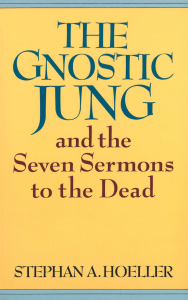Back in 2004, Dave Stoverden in Colorado was active in discussions here. You may have seen this note from his previous posting:
“I have a couple of paragraphs from Stephan Hoeller that do pretty good job of summing up ‘What in the world are gnostics?’
It’s my pleasure to provide the following text from Mr. Hoeller courtesy of The Gnosis Archive (www.gnosis.org) as an introduction to this esteemed scholar and his important works. Many thanks also to Mr. Stoverden for his passion and for sharing his knowledge.

What in the world are gnostics?
The words Gnostic and Gnosticism are not exactly standard features in the vocabulary of contemporary people. In fact, more people are familiar with the antonym of Gnostic, which is agnostic, literally meaning a non-knower or ignoramus, but figuratively describing a person with no faith in religion who still resents being called an atheist. Yet Gnostics were around long before agnostics and for the most part appear to have been a far more exciting category of persons than the latter group. In contradistinction to non-knowers, they considered themselves knowers—gnostikoi in Greek—denoting those who have Gnosis or knowledge. Gnostics were people who lived, for the most part, during the first three or four centuries of the so-called Christian era. Most of them probably would not have called themselves by the name Gnostic but would have considered themselves Christians, or more rarely Jews, or as belonging to the traditions of the ancient cults of Egypt, Babylon, Greece and Rome. They were not sectarians or the members of a specific new religion, as their detractors claimed, but rather people who shared with each other a certain attitude toward life. This attitude may be said to consist of the conviction that direct, personal and absolute knowledge of the authentic truths of existence is accessible to human beings, and, moreover, that the attainment of such knowledge must always constitute the supreme achievement of human life. This knowledge, or Gnosis, they did not envision as a rational knowledge of a scientific kind, or even as philosophical knowledge of truth, but rather a knowing that arises in the heart in an intuitive and mysterious manner and therefore is called in at least one Gnostic writing (the Gospel of Truth) the Gnosis kardias, the knowledge of the heart. This is obviously a religious concept that is at the same time highly psychological, for the meaning and purpose of life thus appears to be neither faith, with its emphasis on blind belief and equally blind repression, nor works with their extraverted do-goodism, but rather an interior insight and transformation, in short, a depth-psychological process.
If we come to envision the Gnostics as early depth psychologists, then it immediately becomes apparent why the Gnostic teaching and practice was radically different from the teaching and practice of Jewish and Christian orthodoxy. The knowledge of the heart, for which the Gnostics strove, could not be acquired by striking a bargain with Yahweh, by concluding a treaty or covenant which guaranteed physical and spiritual well being to man in exchange for the slave-like carrying out of a set of rules. Neither could Gnosis be won by merely fervently believing that the sacrificial act of one divine man in history could lift the burden of guilt and frustration from one’s shoulders and assure perpetual beatitude beyond the confines of mortal existence The Gnostics did not deny the usefulness of the Torah or the magnificence of the figure of the Christos, the anointed of the most high God. They regarded the Law as necessary for a certain type of personality which requires rules for what today might be called the formation and strengthening of the psychological ego. Neither did they negate the greatness of the mission of the mysterious personage whom in his disguise men knew as the Rabbi Jehoshuah of Nazareth. The Law and the Savior, the two most highly revered concepts of Jew and Christian, became to the Gnostic but means to an end greater than themselves. These became inducements and devices which might, in some fashion, be conducive to personal knowing which, once attained, requires neither law nor faith. To them, as to Carl Jung many centuries later, theology and ethics were but stepping stones on the road to self-knowledge.
Some seventeen or eighteen centuries separate us from the Gnostics. During these centuries Gnosticism became a faith not only forgotten (as one of its interpreters, G. R. S. Mead, called it) but also a faith and a truth repressed. It seems that almost no group has been so relentlessly and consistently feared and hated for nearly two millennia as were the unhappy Gnostics. Textbooks of theology still refer to them as the first and most pernicious of all heretics, and the age of ecumenism seems to have extended none of the benefits of Christian love to them. Long before Hitler, the Emperor Constantine and his cruel bishops began the practice of religious genocide against the Gnostics, their first holocausts to be followed by many more through history. The last major persecution concluded with the burning of over 200 latter-day Gnostics in 1244 in the castle of Montsegur in France, an event which Laurence Durell described as the Thermopylae of the Gnostic soul. Still some prominent representatives of the victims of the latest holocaust have not regarded the most persecuted religious minority in history as a companion in misfortune, as the attacks of Martin Buber on Jung and on Gnosticism indicate. Jews and Christians, Catholics, Protestants and the Eastern Orthodox (and, in the case of the Manichaean Gnosis, even Zoroastrians, Moslems and Buddhists) have hated and persecuted the Gnostics with a persistent determination.
Featured Video: Where do the Gnostics Stand? – Stephan Hoeller 1/8
